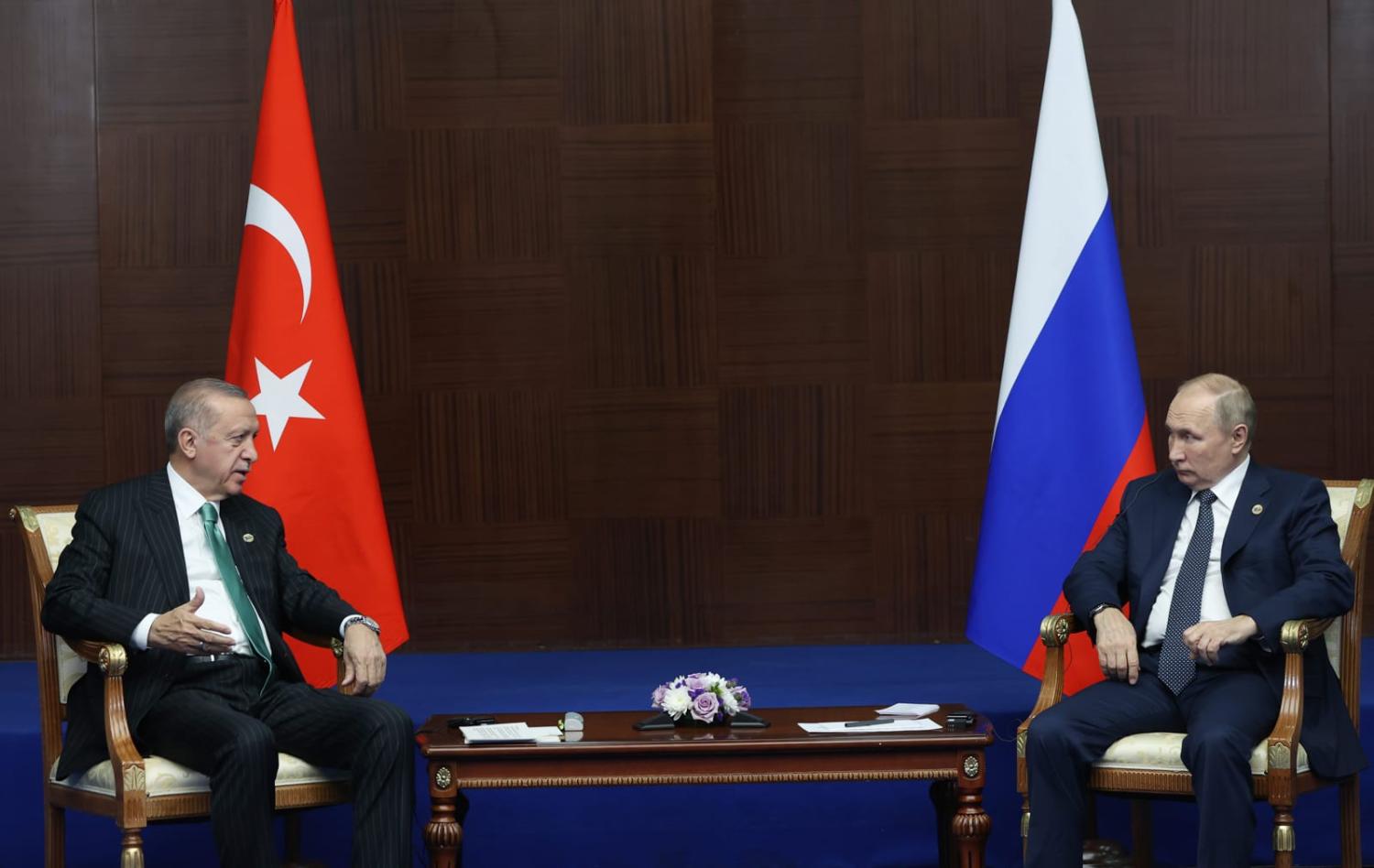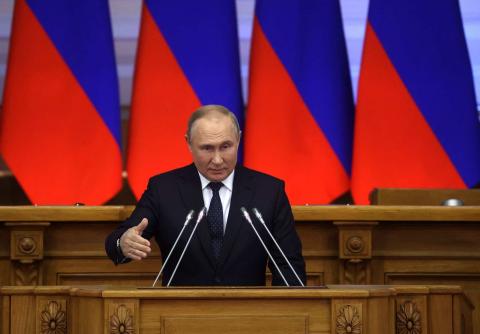Türkiye’s President Recep Tayyip Erdoğan is openly arming and supporting Ukraine, and even publicly humiliating Moscow. Yet Russia’s leader Vladimir Putin has little choice but to accept the destruction and denunciation. Türkiye, perversely, is crucial to Putin’s aims.
Erdoğan decided this week to allow Ukraine’s President Volodymyr Zelenskyy to bring home five Azov Regiment commanders, held by Russia in May last year following the battle for Mariupol and later traded as part of a Turkish-brokered prisoner exchange. The Kremlin decries the volunteer Azov Regiment as “Nazis” and a terrorist organisation, with the decision to allow the commanders to return portrayed in Russia as another Turkish “stab in the back”. Unlike hundreds of other Azov fighters, who were released in exchange for Putin’s friend Viktor Medvedchuk in September 2022, the five top commanders were “evacuated” to Türkiye, where they were supposed to stay until the end of the war.
“The return of the leaders of Azov from Türkiye to Ukraine is nothing more than a direct violation of the terms of the existing agreements” Putin’s spokesman Dmitry Peskov said, adding that the release was a “result of heavy pressure from Türkiye’s NATO allies”.
That effort to deflect some of the blame for Erdoğan’s actions, along with Peskov going on to emphasise that Moscow plans to preserve its political and economic ties with Ankara, is indicative of the tightrope Russia walks. Moscow hopes to see Türkiye become a regional gas hub. More importantly, Türkiye remains a safe haven for Russian oligarchs who have been ostracised by the West.
All this is why Russia’s Federation Council’s threat about adding Türkiye to the list of “unfriendly countries” is unlikely to ever be approved by Putin.
Even so, the return of the five Azov commanders to Ukraine – where they will continue fighting against the Russian forces – represents another humiliation for the Russian president. And to come so soon after Yevgeny Prigozhin’s aborted mutiny, it could carry an impact for Putin’s reign. Russian “hardliners” – be it Prigozhin, or other actors – may increasingly question Putin’s “special relationship” with his “dear friend” Erdoğan.
For now, the Kremlin will almost certainly continue doing business as usual with Ankara. Russia’s Foreign Ministry did not react to Turkish Foreign Minister Hakan Fidan’s meeting on 7 July with the exiled leader of the Crimean Tatars, Mustafa Kirimoglu, in Istanbul. Moscow does not seem willing to take any steps that could affect its cooperation with Ankara.
Türkiye also offers a further economic lifeline. Although Russia has repeatedly threatened to suspend its participation in the Black Sea Grain Initiative (also known as the grain deal, which supplies much needed produce to world markets), this week Russian Foreign Minister Sergey Lavrov discussed the deal with Fidan. A “goodwill gesture”, as Moscow likes to cast it, could extend the deal that allows Ukraine to freely export its grains through the Black Sea ports to Türkiye’s. But even if the Kremlin quits the deal, that does not necessarily mean that it will impose a blockade of the Black Sea.
Policymakers in Moscow are quite aware that Kyiv and Ankara could simply continue implementing the grain deal without Russian participation. Should Russia pull out of the agreement, there are fears in Russia that the Turkish navy could start unilaterally ensuring the safety of the Black Sea corridor. Such an outcome would represent another humiliation for the Kremlin. Russia would unlikely dare to sink Turkish ships (a NATO member, after all), leaving the potential of a Turkish navy presence in Ukraine’s territorial waters, and even the opportunity to provide Ukraine with weapons via the sea. Türkiye is already supplying Ukraine with combat drones, launch rocket systems, and armoured vehicles, among other military equipment. Türkiye’s defence company Baykar has said it will build a drone factory in Ukraine, with production planned to start in 2025.
It is clear that the Russian debacle in Ukraine has given Türkiye increased leverage over Russia. Erdoğan has an upper hand over Putin, and the Russian leader reportedly still sees the Turkish president as a “man of his word”. Despite the saga with the Azov Regiment commanders, as well as Turkish military cooperation with Ukraine, Putin has accepted Erdoğan’s invitation to visit Türkiye next month. Can Putin be sure that his “friend” will not “betray” him again, have him arrested, and send him to The Hague where he could face a war crime trial?

